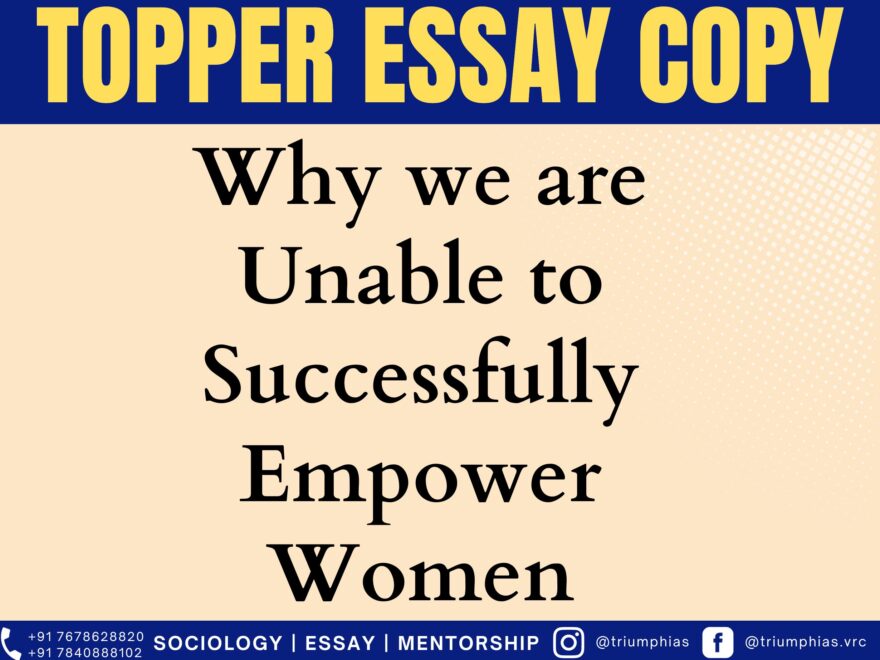Aayush Gupta

Essay Topic:
Why we Unable to Successfully Empower Women
(Relevant for Essay Writing for UPSC Civil Services Examination)
Why we Unable to Successfully Empower Women
The stories of Ananditha and Phoolwati are not uncommon across India today. While the two represent opposite ends of the economic spectrum- their experience has one thread in common – the discrimination and marginalization they face by virtue of being women. While their stories differ in qualitative aspects – the social setup it operates in is common. A HISTORY OF OPPRESSIONWomen have been (arguably albeit) the most marginalized group in history. Karl Marx spoke- “the history of all mankind has been the history of class struggle”– he mentioned various classes: slaves, serfs, workers but omitted to mention the most marginalized among them all – women. Being a man, perhaps his worldview was limited by his own experiences. Throughout history, women have been the worst victims of violence- during war and even otherwise. Their economic role has been marginalized; their political role has been only a footnote in history. Societally, perhaps after the very early ancient period – they have almost always been relegated to a secondary position. When they belonged to a socially marginalized group – they faced this discrimination doubly. The recent Hathras Rape case shows how the situation has not changed radically from the past and the toxic culture of masculinity still pervades society even today. AGAINST MARCH OF HISTORYWhile the women’s movement has a long history, in modern times women began to play a major role in the economy and society post-World War – I. Since then, governments all over the world have taken a number of steps for women’s empowerment. Constitutionally – the right to equality is guaranteed all over the world (with the exception of a few countries) for instance – the Indian constitution gives it Article 14, 15, and 16. The Kenyan constitution goes even further and lays down the 2/3rds rule – whereby no institution would have more than 2/3 representation from any one gender. A number of laws have been enacted to safeguard women’s rights. In India, three such important laws are – Domestic Violence Act, Hindu Law (Amendment) Act 2013, Sexual Harassment (prohibition) at Workplace Act among others like Dowry Prohibition etc. A variety of social movements have emerged all over the world from France to America to India. In India, the social reformers of the 19th and 20th century like Raja Rammohan Roy, Ishwar Chandra Vidyasagar, and B.M Malabari played an instrumental role in uplifting the status of women. The National movement further improved their status. The political participation of women has also increased with the 73rd and 74th Amendments guaranteeing 33% reservation for women at the local government level. Today our country has more than five lakh elected women’s representatives across various levels. However, despite all these measures, as we observed in the case of Ananditha & Phoolwati- women empowerment remains a chimera – why? A STRUCTURAL DISADVANTAGERecently NSSO released the results of its time-use survey. It revealed that women spend as much as 7 times more time on unpaid care work than their male counterparts. Moreover, the survey revealed that men tend to do more such work when they are unemployed, whereas women do more when they fall out of the labor force itself. Thus, the implications are clear – not only is the work by women not quantified, but by gender of this work, they are often forced to drop out of the labor force itself. Marx aptly observed that the economic superstructure determines the societal and political structure built over it. Economically, women remain one of the most disadvantaged groups. They face the double burden of unpaid care work and economically recognized/counted work. Their labor force participation rate remains low – across the world and perhaps in one of the worst in India. The gender pay gap is still wide – approximately 20-40% less than their male counterparts. They also face structural impediments -> subject to patriarchal norms and sexual harassment, in access to public spaces AND Biological impediments -> childbirth negatively impacts career prospects and widens pay gap. They are also negatively placed in access to resources- our outdated succession laws have ensured that women are excluded from family inheritance. This landlessness, especially in rural areas – adversely affects their bargaining power. It also must be observed that these economic impediments work within a social structure which reinforces exclusion. PATRIARCHY – THE REAL DEMONUltimately the failure of all our well-intentioned and well-meaning efforts to uplift the better half of humanity fail due to the culture of patriarchy. So deep and pervasive does it permeate the human psyche that we often cannot perceive the many disastrous effects it has on women. These norms expect women to be in a subservient role to men. Thus, they ensure exclusion from workforce and resources, promote violence against women, lead to son preference and retard overall growth of women – in health, education, and nutrition. A DEEPER MULTIFACETED PROBLEMThis hydra-headed creature can thus spread its tentacles across many dimensions which frustrate the efforts to empower women. There is a deep chauvinistic culture which pervades across most cultures. It is telling that the oldest democracy in the world – U.S.A has not had a single female president in over 230 years of existence! This culture affects the corporate world too- few of the CEOs of top 500 companies in the world are women. This culture subtly subverts the inherent right of women. Thus, while politically women have 33% reservation, in practice their situation has scarcely improved. The ‘panch-pati’ syndrome is well-known and even so openly brazen that it does not evoke a sense of surprise. Perhaps another facet of this is women’s inadequate representation in the administration. Women constitute less than 10% of the police force in India. In other fields as well – e.g., most secretary-level positions held by men – women are clearly underrepresented. This is a major impediment towards the success of any policy. The inadequate representation in parliament (less than 100 out of 550) leads to poorly drafted laws – thus we still have marital rape as an exception, domestic violence is treated as a civil matter – with the right to maintenance and there are loopholes in basic legislations like the Dowry Prohibition Act. The fact that the (former) Chief Justice of India was accused of sexual harassment and the manner in which the matter was dealt with – demonstrates aptly how deep the rot runs. THE SILVER LININGHumanism and progress which guide modern thinking today demonstrate that we have and have the capacities to progress. A few positive steps which are low-hanging fruits can be implemented. A strong legal framework – not a half-hearted attempt can be put in place, so that existing laws are strengthened, new laws brought in and their enforcement ensured. A women empowerment policy can be formulated – across states and at the center – which addresses various concerns like gender-based violence, inadequate representation and economic exclusion etc. A realization of the fact that women’s empowerment will go a long way towards empowering the nation itself, will act as a catalyst towards increasing the tempo of action. Thus, while we have miles to go before we reach the promised land – of true equality between men and women – a few steps can go a long way in achieving this. The current government in India has been a flagbearer in these efforts- with steps like the BBBP, Ujjwala Yojana and others. More and more efforts on these lines will bring us closer to our goal. |
To master these intricacies and fare well in the Sociology Optional Syllabus, aspiring sociologists might benefit from guidance by the Best Sociology Optional Teacher and participation in the Best Sociology Optional Coaching. These avenues provide comprehensive assistance, ensuring a solid understanding of sociology’s diverse methodologies and techniques
Meta Tags:
Urbanisation, Blessing, Disguise, Economic Growth, Cultural Diversity, Environmental Challenges, India, Social Inclusion, Sustainable Development, SDG Goals, Urbanization is a blessing in disguise, Laxman Tiwari, Laxman Tiwari upsc, Laxman Tiwari CSE, Laxman Tiwari Essay copy, Laxman Tiwari Essay test copy

Why Vikash Ranjan’s foundation Classes for Essay?
Proper guidance and assistance are required to learn the skill of writing essay topics in CSE examination. VIKASH RANJAN SIR at TRIUMPH IAS guides students according to the Recent Trends of UPSC, making him the Best Essay Teacher for Essay writing UPSC.
At Triumph IAS, the Best Essay Writing Coaching platform, we not only provide the best study material and applied classes of Essay for IAS but also conduct regular assignments and class tests to assess candidates’ writing skills and understanding of the subject.
Choose The Best Essay Writing Teacher for IAS Preparation and Know our Approach for Essay?
- The Programme is Planned & Executed in a Way that You Write a good Essay for obtaining Effective Score of 140 Plus.
- In this programme we provide Classes on
- How to INTRODUCE The Topic in Context of the THEME of the Essay
- How to Elaborate & Explain the Topic-Theme on Temporal Scale & Sectoral Scale as well as Intellectual Scale in the MAIN BODY of the Essay.
- How to Sum up the Topic in CONCLUSION in Context of the Essay Topic Theme.
- ︎We will Teach You How to use the Knowledge Matrix of General Studies & Optional to write a Good Essay more Logically and Coherently.
- After the Classes You have to “Write to Learn & Learn to Score” .This means You have to Write the Essay Test Papers & Learn from the Feedback & Discussions.
Why Essay is Important and What We Offer in “Essay Test Series”?
- Triumph’s Essay Upgradation Test Series (Under Personal Guidance of Vikash Ranjan Sir) doesn’t only focus on improving student’s linguistic skills but also focus on improving student’s ability to comprehend the topic-sentence (subject) recall & relate the facts, concepts, propose thesis-statements, and logically assimilate the ideas & counter ideas with clarity in expression on temporal & Sectoral Scales of knowledge.
- Further students are provided one-on-one INTERACTION* Session with Vikash Ranjan Sir. Students get personal feedback on their strength and weaknesses, regarding what is ‘good about their essay and what more should be done to make it a better one’ by Vikash Ranjan Sir.
Why to take up this “Essay Test Series and Foundation” Course?
- Essay is Low hanging Fruit. Marks in Essay is Effectively Contributing in Final Selection in New Pattern of Mains Exam. With a Well Developed ‘Knowledge Matrix and Rigorous Practice’, One can Score upto 160 + in Essay. So IAS Aspirants should never Ignore Essay Preparation
- Inculcating Writing Competency in Essay for IAS, which is Different from Essay in English, Essay in School and College.
Follow us :
🔎 https://www.instagram.com/triumphias
🔎https://www.youtube.com/c/TriumphIAS
🔎https://t.me/VikashRanjanSociology
Find More Blogs…
| Compare and contrast Karl Marx’s and Max weber’s | Karl Marx- Historical Materialism |
| Position of Women In the Modern Indian Society | Sociology: Social system and pattern variables |
keyword: Unable to Successfully Empower Women, Unable to Successfully Empower Women, Unable to Successfully Empower Women, Unable to Successfully Empower Women, Unable to Successfully Empower Women, Unable to Successfully Empower Women, Unable to Successfully Empower Women, Unable to Successfully Empower Women, Unable to Successfully Empower Women Unable to Successfully Empower Women, Unable to Successfully Empower Women, Unable to Successfully Empower Women, Unable to Successfully Empower Women, Unable to Successfully Empower Women, Unable to Successfully Empower Women, Unable to Successfully Empower Women, Unable to Successfully Empower Women, Unable to Successfully Empower Women, Unable to Successfully Empower Women, Unable to Successfully Empower Women



One comment